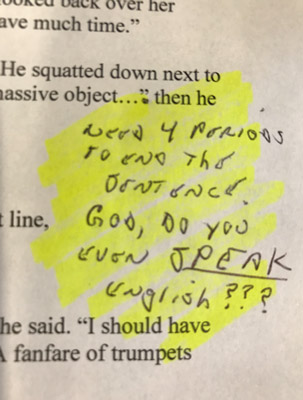It’s hard to get honest feedback. But it’s important. I fall in love with my characters. I know what drives them, what they fear, what they want, and even their favorite ice cream. How much do readers need to know? What’s critical to the story? What’s boring? If only we had a way for writers to share their early drafts in a “safe” environment and get the feedback we all desperately need. Oh, hey, we do: Critique Groups.
Theoretically, writers get together, read each other’s drivel and provide insightful comments and suggestions for improvement. Poppycock.
What actually happens is more time consuming and less helpful. In some groups, writers read their allotted number of pages aloud to each other and sit back breathlessly awaiting feedback. The theory, I think, is that the writer is best able to imbue the prose with the correct intonation and emphasis. I flash back to reading aloud in grade school and the agony of suffering through hearing Johnny, two rows over, stumble through the paragraph the teacher has assigned him to read. Agonizing for me, horrifying for Johnny. Tedious at best. Fear-invoking for most. Now Johnny’s grown up.
He’s gotten better at writing but hasn’t read anything out loud since Ms. Lee made him do it in fourth grade. Johnny’s a little better at this now, but not much, and not enough. I suffer through it hoping that my investment of time will pay off with cheers and applause when I read my draft. The more sensitive in the group will be moved to tears. First, though, I have to give Johnny feedback.
“Where did the giant snake come from?”
“Another dimension,” Johnny answers.
“Okay. Why don’t any of the guys in red robes react when he falls into their midst?”
“They don’t know he’s there yet.”
“But you said the snake was ‘really, really, big’ and that it hit the ground with a ‘really, really, loud’ crash.”
“You don’t get it.” Now I’m an idiot for not understanding his work.
And so it goes. Most members of the groups are polite and take critiques well. They want to get better. But we don’t want to hurt each other’s feelings, so we tend to limit comments to things like “You used ‘epiphany’ eight times on one page.” We moderate our commentary. We get moderated commentary in return.
Some groups are better, and the members play to their strengths: Fern is great at structure and style, Mack gets to the guts of the plot and the emotions that should be displayed, I try to focus on the logic of the plot.
Personally, I’d rather read someone’s pages in advance and have some time to mull them over. Then, when the group gets together, we’ve had the reader’s experience – what it will be like for someone that actually picks up this book. I’ve had decent success when I ask for critiques to be harsh. Don’t insult my Mom, but feel free to tell that my writing is incomprehensible and that I’ve got too many characters for anyone to keep straight. That seems to help. Remo is different. Here’s a sample of his notes on an early draft:
Thanks. I’m dense at times and make more than my share of mistakes, but I can’t get better unless I get fairly pointed feedback. He’s right.
guidetogrammar.org says: If words are left off at the end of a sentence, and that is all that is omitted, indicate the omission with ellipsis marks (preceded and followed by a space) and then indicate the end of the sentence with a period … .

